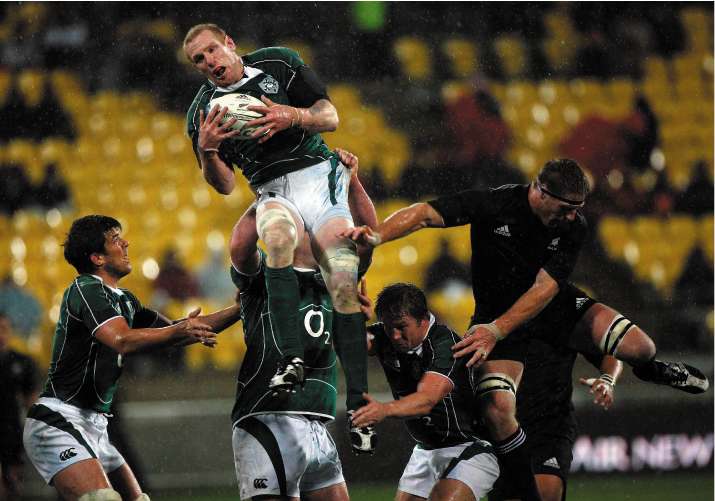New Zealand 21 Ireland 2: O'Connell's Ireland show true worth

Your support helps us to tell the story
From reproductive rights to climate change to Big Tech, The Independent is on the ground when the story is developing. Whether it's investigating the financials of Elon Musk's pro-Trump PAC or producing our latest documentary, 'The A Word', which shines a light on the American women fighting for reproductive rights, we know how important it is to parse out the facts from the messaging.
At such a critical moment in US history, we need reporters on the ground. Your donation allows us to keep sending journalists to speak to both sides of the story.
The Independent is trusted by Americans across the entire political spectrum. And unlike many other quality news outlets, we choose not to lock Americans out of our reporting and analysis with paywalls. We believe quality journalism should be available to everyone, paid for by those who can afford it.
Your support makes all the difference.Not so very long ago, the Rugby Football Union chairman, Martyn Thomas, effectively dismissed England's comprehensive Six Nations victory over Ireland as an irrelevance, thereby cutting the last piece of ground from beneath the feet of the head coach, Brian Ashton, who was duly declared surplus to requirements a week later.
"The Irish team we beat weren't that great," Thomas pronounced. They were very nearly good enough to beat the All Blacks in their own capital city on Saturday, however, and had they done so, the sound of pinstriped backsides squirming on the leather upholstery at Twickenham would have been close to deafening.
The tourists reached the interval at 8-8 and were still in there fighting at 11-11 three minutes into the final quarter. Then, the Munster loose-head prop Marcus Horan half-heartedly dropped his forearm on an opponent at a pile-up – a minor misdemeanour, but one that attracted the notice of the increasingly puritanical English referee Chris White, who penalised him. Horan and his colleagues were still shaking their heads in exasperation when Daniel Carter claimed the three points on offer and, as a result, the balance tilted decisively towards New Zealand.
Having slammed the door on Ireland, they locked it almost immediately, Carter slipping away from Ronan O'Gara in open field to lay the foundations for Ma'a Nonu's wrap-up try. The All Blacks just about deserved their victory, for they had scrummaged strongly and foraged magnificently. Yet the Irish could, perhaps should, have recorded a first victory in 105 years of rivalry. Certainly, they will rarely have a better opportunity.
While the New Zealanders were raving about the performance of their captain, the flanker Richie McCaw, whose work on the deck was as accomplished as ever, the visitors could legitimately point to two exceptional forwards of their own. Paul O'Connell was the best tight forward on view by a distance, while David Wallace gave the masterly McCaw a serious run for his money. Time and again, the open-side flanker made ground in the heavy traffic; time and again, he bolstered the fragile midfield defence of O'Gara and Paddy Wallace by hunting down the dangerous Nonu.
True, the Irish could not hope to match New Zealand in the flair department; indeed, their supporters would have waited for ever and a day to see an attack executed as precisely as the one instigated by Conrad Smith and finished by Sitiveni Sivivatu in the 15th minute. But the wet conditions suited their pick-and-go game, not to mention O'Gara's accuracy with the boot, and there were times, especially in the first half, when the most shocking of shock victories seemed possible.
Graham Henry, a coach under pressure if ever there was one, seemed happy enough with his All Blacks. "We performed particularly well at the set pieces, we won the forward battle and nobody went down with hypothermia, so I see it as a major achievement," he said, before wondering about the logic of a schedule that sees rugby played in Wellington in June and in London in November. "Shouldn't it be the other way round?" he asked.
Probably not, given that union was designed for the winter months, not the summer ones. And anyway, this was nothing more than one of Henry's little distractions. He knew, as the Irish knew, that the game could have gone either way. He also knows that as England will be nowhere near as vulnerable at the set piece, the next two Tests should be more challenging still.
New Zealand: M Muliaina (Waikato); A Tuitavake (North Harbour), C Smith, M Nonu (both Wellington), S Sivivatu (Waikato); D Carter, A Ellis (both Canterbury); N Tialata (Wellington), A Hore (Taranaki), J Afoa (Auckland), B Thorn, A Williams (both Tasman), R So'oialo (Wellington), R McCaw (Canterbury, capt), J Kaino (Auckland). Replacements: J Schwalger (Wellington) for Afoa, 34; A Thomson (Otago) for So'oialo, 42-48 & for Kaino 80; L MacDonald (Canterbury) for Tuitavake, 51; K Mealamu (Auckland) for Hore, 57.
Ireland: R Kearney; S Horgan, B O'Driscoll (capt; all Leinster), P Wallace , T Bowe (both Ulster); R O'Gara (Munster), E Reddan (Wasps); M Horan, J Flannery, J Hayes, D O'Callaghan, P O'Connell, D Leamy, D Wallace (all Munster), J Heaslip (Leinster). Replacements: R Best (Ulster) for Flannery, 54; T Buckley (Munster) for Horan, 65; S Jennings (Leinster) for Heaslip, 76; P Stringer (Munster) for Reddan, 77; G Murphy (Leicester) for Kearney, 80.
Referee: C White (England).
Join our commenting forum
Join thought-provoking conversations, follow other Independent readers and see their replies
Comments